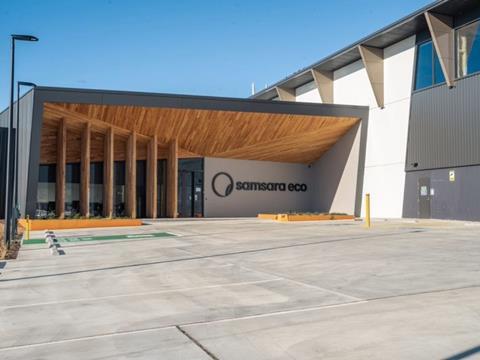
Australian biotech company Samsara Eco has opened its first plant, intended to increase the company’s ability to produce ‘virgin-identical, low-carbon’ circular materials like recycled nylon and polyester at scale with applications across apparel, packaging and automotives.
Located in Jerrabomberra, Australia, the new headquarters and plant houses EosEco, Samsara Eco’s enzymatic recycling technology. The technology uses AI-crafted enzymes to break down mixed plastics destined for landfill into recycled raw materials for brands to incorporate into their product lines.
The facility also houses expanded enzyme production facilities, allowing the company to build out its proprietary AI-powered enzyme discovery and development platform to find recycling solutions for a broader range of plastics.
Samsara Eco says the materials made at the new plant will feature in upcoming product lines for brands like lululemon, as well as pilot programs and trials with brands across textiles, automotive and packaging. The facility will research recycling solutions for materials such as spandex with The LYCRA Company and collaborate with Deakin University’s Recycling and Clean Energy Commercialisation Hub, part of the Australian Government’s Trailblazer Universities programme.
The company also plans to open its first nylon 6,6 commercial plant in Asia in 2028, in collaboration with engineering partner KBR. The 20,000-tonne facility will be the first of multiple international commercial facilities.
In January, Dow announced a collaboration with Brivaplast and TecnoGi to reprocess imperfect perfume caps for use in luxury footwear and leather goods, aiming to advance circularity by keeping high-quality materials in the loop for longer. The companies hope to reduce manufacturing scrap and enhance value across multiple sectors.
More recently, Reconomy launched Reconomy Nordics, a regional setup aiming to provide a data-driven circular economy solution for its waste management, recycling and materials recovery brands. Reconomy customers will be able to utilize its technology and data-driven insights to make better use of materials, lower carbon footprint and meet regulatory requirements across the region.
If you liked this story, you might also enjoy:
The ultimate guide to the Packaging and Packaging Waste Regulation in 2025
How are the top brands progressing on packaging sustainability?
Everything you need to know about global packaging sustainability regulation in 2025
The key to increasing the use of reusable packaging in supermarkets














No comments yet